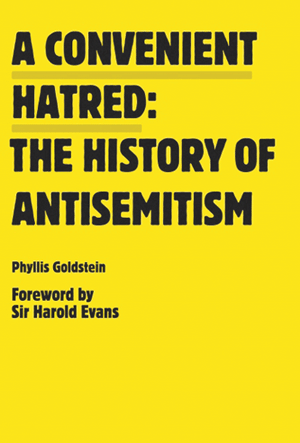Reviewed by NEAL GENDLER
What do you say when the young son you’ve just put to bed looks up at you and says: “Daddy, why does everybody hate us?”
I gave the usual answers, starting with “not everybody hates us,” and going on through people falsely blaming us for Jesus’ death to some people thinking Jews control everything, and then to scapegoating.
But I’ve never had an explanation I considered satisfying. In A Convenient Hatred: The History of Antisemitism, Phyllis Goldstein comes close — starting with Jews as outsiders in ancient societies because they did not follow conquerors’ expectations of adopting the new rulers’ gods.
From there, Goldstein provides a good overview of Jew-hatred’s history, saying that many of the elements of modern anti-Semitism can be traced to the Roman period. Jewish philosopher Philo saw and documented a pogrom in 38 C.E. in Alexandria, Egypt, when mad Emperor Caligula demanded to be worshipped as a god. Opportunistic participants included Alexandrians of Greek descent who wanted to regain control of the city and limit the power of its Jews.

That pretty much summarizes the twin themes of 20 centuries of hatred: Jews’ rejection of others’ beliefs and Jews having too much power — a charge that can embrace moneylending, into which Christians forced Jews by closing off other occupations.
But if we have so much power, why are we so often the victims of discrimination, persecution and slaughter? Apparently, that’s part of our cunning, to appear helpless while pulling the world’s strings — political, financial and human. Accusations range from poisoning wells to injecting Muslims with AIDS.
Nonsense? Of course. As acclaimed British journalist (and The American Century author) Sir Harold Evans says perfectly in his foreword: anti-Semitism “is a mental condition conducive to paranoia and impervious to truth.”
Goldstein divides consequences of that mental condition into chapters following both time and themes. “Separation: Synagogue and Church, Jew and Christian (29-414 C.E.)” reveals hostility’s roots. “Holy Wars and Antisemitism (700s-1300),” includes the Crusades, “for many Christians, showing contempt for Jews became a way of affirming their own faith.”
The convenience of Jew hatred for bad causes appears in later chapters, including “Antisemitism in an Age of Nationalism (1840-1878),” and “Antisemitism and the Cold War (1945-2000).”
The book is an easy read, even too easy. Writing for general audiences, Goldstein prudently defines Jewish terms, but defining socialism, capitalism and even inflation borders on insulting. Such textbook tints may be natural; Facing History and Ourselves, which published the book, says it “fosters democracy and combats antisemitism, racism and other hatreds,” educating “students of diverse backgrounds.” Goldstein is its senior writer on the Shoah and issues of race.
If occasionally too basic, the book is a convenient history, presenting often-overlooked information. For example, “Most Christians in the 1500s considered toleration morally wrong. They were convinced that the very presence of nonbelievers in a community threatened that community’s welfare.”
We seldom hear that the Russian army uprooted more than 600,000 Jews by late summer 1915, brutally driving them from homes near the front on fake allegations of spying and sabotage. And histories that jump from May 1945 to Aliyah Bet — illegal immigration by Jews to the British Mandate for Palestine in violation of British restrictions — may pass too quickly over Europe’s postwar anti-Semitism and the maltreatment of Jews in displaced persons camps.
A special investigator for President Harry Truman reported in August 1945 that “[We] appear to be treating the Jews as the Nazis treated them except that we do not exterminate them.” Gen. George Patton, who administered southern Germany, responded that DPs were not human beings, “and this applies particularly to the Jews, who are lower than animals.”
Even so, how can people believe such crazy slander as Jews killing children to get blood for baking matzot — despite the Torah’s prohibition of blood in food? Goldstein only can note what we see every day about Israel: “An accusation made repeatedly tends to be believed, no matter how illogical and false it is.”
Sounds like Goebbels. He’d have loved the Internet.
***
Neal Gendler is a Minneapolis writer and editor.
(American Jewish World, 12.23.11)




















Historically Jews seem to be the whipping boys of collectivists, despite, in most cases, embracing collectivism. I suspect it is because jews are culturally viral and insular. (not an insult, exist inside other cultures) They do not have a moral position other than “we” “them” and “hide”. The problem with that is that when hiding so well, you turn against each other.
Jews are their own success, and then their own end. You will be blamed for everything, in the collectivist fury that is coming. Freedom will be betrayed, and smashed, and Jews will be the first targets.
Jews have stood for whatever was politically expedient. As self preservation. It has worked culturally, in some sense. Results have been tragic individually.
Perhaps, you could stand for freedom this time? Life, liberty, property? The Rule of Law?
Not man.
Not A man, ffs.
I’m pro-Jew, pro-Israel even, fwiw, but historically, culturally, you hide.
Not you. You speak up. You have courage. But culturally.
When you hide you look guilty. And the collectivists will smell blood.